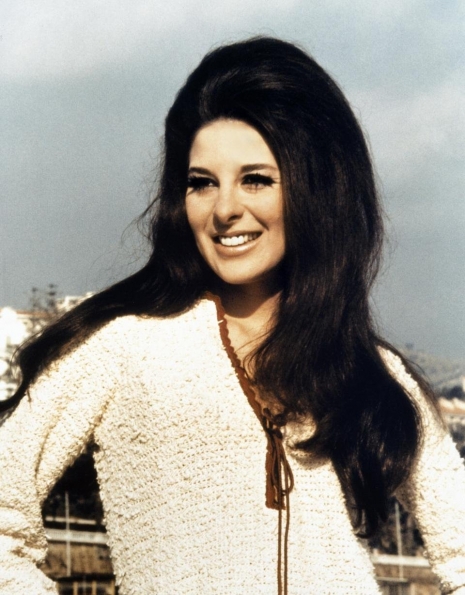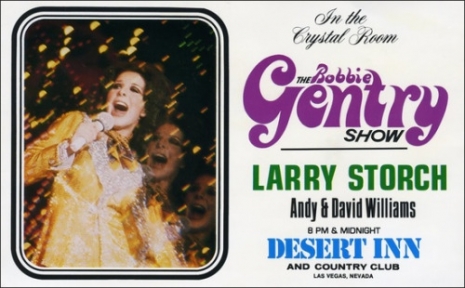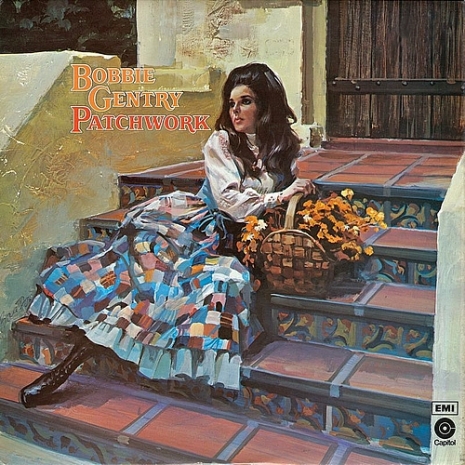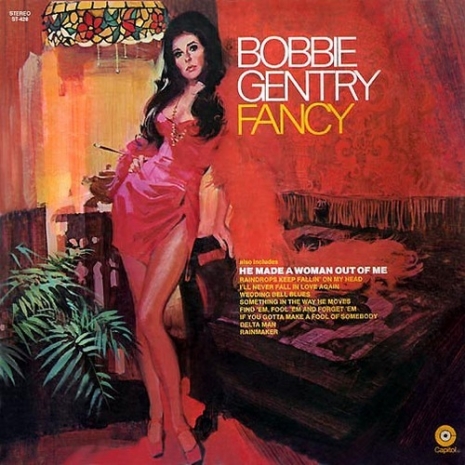
One of the first major country “crossover” artists, Bobbie Gentry became an overnight sensation with her massive 1967 hit single, the hauntingly enigmatic “Ode to Billie Joe.” Sultry and sexy yet obviously whip-smart, the smoky-voiced Gentry was also one of the first female country artists to write and produce her own music. Additionally she could play guitar (with an immediately recognizable hard finger-plucked style), piano, banjo, bass vibraphone and other instruments. She was as gorgeous as she was talented, a poised and classy Southern belle born in Chickasaw County, Mississippi and raised on her grandparents’ farm in a home with no electricity. But when Billie Joe McAllister jumped off the Tallahatchie Bridge he pushed even the Beatles from the top of the pop charts. The song sold over 50 million copies, and Gentry was instantly among the most famous people in America, winning four Grammy awards for her debut.
Bobbie Gentry was a nearly ubiquitous presence on American (and British) television of the 60s and 70s. You might see her one night singing a duet with Johnny Cash, the next night she’d be on The Hollywood Palace clowning around with Bing Crosby. Or on Ed Sullivan. Glen Campbell’s show. A Bob Hope special. The Smothers Brothers. Tom Jones. Andy Williams. The Carol Burnett Show. Morecambe & Wise. The Grammy Awards. Her own BBC series The Bobbie Gentry Show or her own CBS program The Bobbie Gentry Happiness Hour.

If you look back at the albums she released at a rapid clip in the years between 1967 and 1971 there are two obvious categories to divide Bobbie Gentry’s music into: the incredible songs she wrote and produced herself, which were catchy, deep, funny, sexy, bluesy, often rockin’ and sometimes even somewhat sinister, versus the songs Capitol Records had her record—the same pop covers as everyone else and duets with Glenn Campbell—to keep pumping out the product. She only really actively recorded for about five years. Throughout the 1970s she was one of the biggest-drawing acts on the Las Vegas strip, but she largely stayed out of the recording studio after 1971’s lost masterpiece concept album Patchwork.

The cover of her final album, 1971’s ‘Patchwork’ was an uncredited self-portrait.
To my mind, aside from “Ode to Billie Joe”—which is obviously immortal and will be heard until the end of human history—Bobbie Gentry is a criminally underrated artist and musician. I think she was probably just a little too “light entertainment” to be looked upon as cool by retro-interested hipsters, like the Carpenters or ABBA and this is too bad because she made some truly great music, on par with really anyone you could name. Some record nerds even swear that the Ode to Billie Joe album—something you’ve probably passed by in your crate digging a million times—is the equal of Dusty in Memphis and maybe it is. I prefer her Patchwork album. Certainly they are both in the same rarified category as Dusty in Memphis, which is saying a lot—and by all means you should definitely pick it up the next time you find a copy for a dollar—but I’d still also recommend a good all killer/no filler CD anthology like Chickasaw County Child: The Artistry of Bobbie Gentry.
Due to a savvy business sense and “Ode to Billie Joe” selling over 200 million records in cover versions (everyone from the Supremes to the Fifth Dimension to Rosanne Cash covered the song) Bobbie Gentry became quite wealthy. Along with Andy Williams and singer Ed Ames, Gentry was a minority investor in the Phoenix Suns basketball team; she also made a hefty percentage of the profits from The Ode to Billy Joe (sic) movie along with earning several million dollars each year performing grueling residencies in Las Vegas. (Later she’d earn several million more in royalties from Reba McEntire’s 1990 cover of her 1969 hit “Fancy.”)
She was show business royalty but in the early eighties, no longer craving the spotlight after more than a decade of frantic nonstop work, Bobbie Gentry retired from show business and has not been seen or heard from since. Last year Washington Post reporter Neely Tucker posed the same question posed by singer Jill Souble: “Whatever happened to Bobbie Gentry?” and went in search of country music’s elusive Garbo. She found her all right before Gentry—now in her early 70s and living in a gated community in Tennessee—hung up on her.
Bobbie Gentry performs “Ode To Billie Joe” live on the BBC in 1968.
A sexy, slinky rendition of “Touch ‘Em With Love” on ‘The Morecambe & Wise Show’ in 1969.
Bobbie Gentry’s 1968 British television series began with one of her signature songs, “Mississippi Delta,” the opening track on the ‘Ode to Billie Joe’ album.
“Papa, Won’t You Let Me Go to Town With You?”
“Peaceful” and “Morning Glory”
1967’s hard-rocking “Mississippi Delta” which outdoes Creedence Clearwater Revival on their own turf a year before their first album.
“I Saw an Angel Die.”

And finally, here’s Bobbie Gentry performing what I consider to be her second best song, “Fancy” (covered by everyone from Reba McEntire to the Lady Bunny). The painting on the cover is another uncredited self-portrait painted by Gentry. Why hasn’t Beyoncé sampled THIS yet???